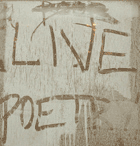(May 2005) The blue wheelchair sat abandoned by the pond.
I sat at lush gardens tonight till dark, reading. Stopped by Whole Foods earlier and picked up fresh herbs, a loaf of crunchy bread, a lime tart, and some Saint Nectaire cheese that disappointed me because it lacks the complexity of Saint Andre, which was Whole Foods’ comparison cheese.
(I knew I should have gone to the farmer’s market instead and purchased local cheese from the friendly dyke cheesemakers.)
Poured some pinot noir into a flask, then took my food, wine, Carole Maso’s Art Lover, and myself to a little creek that runs between two grassy knolls at the gardens.
A beautiful, heavy-branched willow by the water provided shade over the rough stone bench where I sat. I settled in amongst the irises that kine the boulders that line the creek that empties into the pond and read till dark as the ducks swam around me.
There’s a whole chunk of time during graduate school when I missed films and books that were not directly associated with my studies. Kenneth Branaugh and Emma Thompson were all the rage then, but I had neither time nor money to enjoy such extravagances.
Maso’s Art Lover came out during this period, too, and I missed it the first go ‘round nut, boy, what a find now!
This book is hauntingly beautiful and raw and very, very well written.
Maso’s narrative approach is intimate and disarmingly heart-wrenching and the book brims over with insights and observations and tender quirky moments that leave your entire nervous system twitching.
I don’t believe anyone in the midst of losing a father could bear to read this book, but how wonderful it must be if you find a way to acknowledge that connection as you read.
My own father has been dead for six years now and I could still hardly bear to read this story ... and the declarative sketches of her sad, suicidal mother nearly took my breath away.
Here’s an excerpt from her opening page:
Although there is only a slight resemblance, the man can only be her father. You can tell by the way he moves toward her. As she stands up now I can see the intricate jigsaw shapes their bodies make to fit together. They will gnaw off an arm if necessary to properly fit, bleed at a joint, tilt the head, or nod a little too deeply just to maintain the vaguely heart-shaped vacuum that must always exist somehow between them.
•
Meanwhile, as I mentioned way back at the beginning of this entry, someone abandoned a blue wheelchair by the pond. I’d read several chapters by the time I saw the thing and it was getting dark—cone? rod? cone? rod? and that whole confused sight thing—so I wasn’t sure what I was seeing at first. And the heady scent of honeysuckle was so intoxicating that I almost felt drunk. Meanwhile the ducks splashed down in the water around me as I jumped over the rocks to investigate.
I hiked up the grassy knoll and discovered that, right there by the water, was a well-used faded blue wheelchair with a sagging seat.
Maybe it’s the curse of living through a loved one’s repeated suicide attempts or maybe it’s the influence of Maso’s book or maybe it’s the fact that this garden sits near a medical center. Not sure of the source,really, but can tell you that I immediately thought that a dying patient had rolled herself—and it was a her in my mind: Ophelia, Virginia W, my cancer-ridden mother-out-law, and my sad suicidal mother all rolled into one—down from her room and into this lush, late-spring paradise swollen taut with beauty, and thrown herself into the water.
Sometimes I wonder how a person who does not have a personal experience with suicide might translate such a scene.
BEST-OF SPAM: clytemnestra portraiture. (Hmmm. Perhaps Agamemnon Spam sacrificed his daughter Spam in an effort to make it through a challenging spam editor, then Clytemnestra got revenge in a scene that was captured by a digital portraitist? Now that’s obscure.)


No comments:
Post a Comment